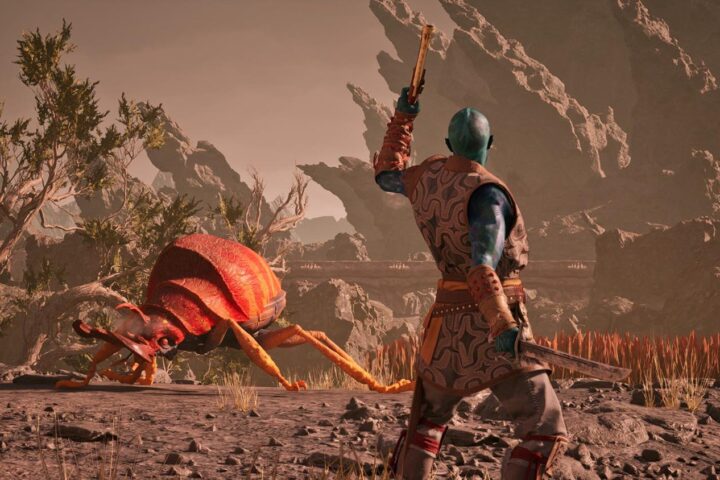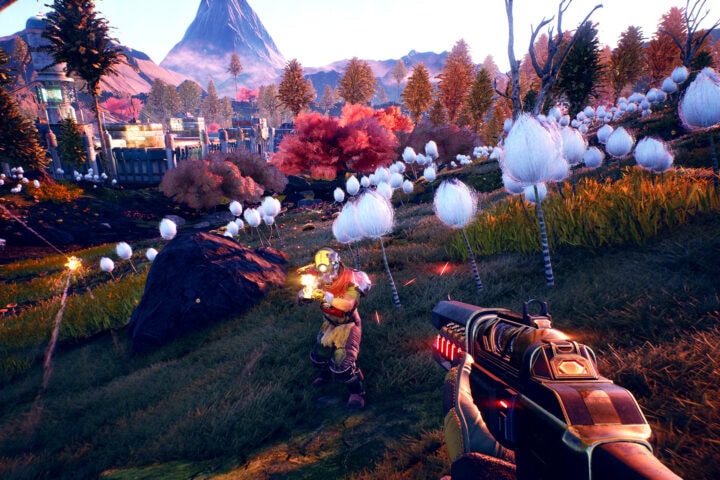In Journey to the Savage Planet, you work for Kindred Aerospace, a dubious space exploration company. At their behest, you’re dropped onto the uncharted planet AR-Y 26 with orders to explore, document, and ultimately plunder the place for resources. All the while, live-action videos of Kindred’s wacky CEO and audio commentary from EKO, the sociopathic ship AI, emphasize that this is all supposed to be comedic. By loudly depicting resource exploitation as well as general disregard for the environment, the company’s personnel, and any semblance of collateral damage, the developers at Typhoon Studios mean to send up colonialism and capitalism at large. (The “savage” part of the game’s title is satirical, or at least it’s supposed to be.) But like The Outer Worlds, the game’s themes feel like facile wallpaper over mechanics that still feed into the same ideas being critiqued.
Like so many modern video games, for example, you must engineer new equipment from whatever stuff you’ve scrounged from the environment. AR-Y 26’s system of branching paths, potential shortcuts, hidden health upgrades, and scan-able objects recalls Metroid Prime, only with the addition of alien alloys and mineral deposits to swat at for crafting materials. It plays like the standard-issue consume ‘em up, only with EKO’s snarky voice whispering in your ear to assure you that this is the point—that this is the commentary.
EKO jokes that your menial progression is incremental at best, and for a while, that’s true; it takes several hours before the game feels particularly satisfying to navigate, as you gradually invest in things like grappling hooks and jetpack boosts that provide double, then triple, then quadruple jumps. The combat never feels particularly good, either, since it demands too much aiming precision from what otherwise amounts to an undemanding series of dodges.
The game might have been onto something if its progression was appropriately banal or if your struggle for resources felt particularly disempowering, positing you as a lowly worker whose labor chiefly benefits someone higher up the ladder. But instead, the materials are your reward. You’re meant to comb the environment’s tall grass and hidden alcoves for any hint of more resources to vacuum up, because the allure of that incremental progress is your carrot on a stick. It’s a compulsive progression loop familiar from so many other games, where finding another orange goo or alloy chest pumps the good chemicals into the right part of your brain. The only difference is a thick cloak of irony that’s supposed to pass for subversiveness.
In a game like Subnautica, the exploration gives you a better sense of the world; it makes you feel small, makes you appreciate what you’re taking from it to survive. At its most intermittently successful, Journey to the Savage Planet is built with a thrilling verticality that might have achieved a comparable, if far less successful, effect. The outcrops of floating rocks are conducive to death-defying shortcuts and last-minute grapples, often letting you hop right off the edge of one area to immediately land in another far below.
But the game scarcely quiets down long enough to give in to these moments of wonder, undercutting any fleeting semblance of awe with obnoxious comedy. AR-Y 26 is a playground to be bulldozed, full of things to poke, prod, and jokily slaughter in Kindred’s name. It is, for example, reasonably humorous that your jetpack vomits out a conspicuous cloud of smug. But it becomes far less funny once EKO insists with a wink that, no, it definitely isn’t harming the environment. The whole game is like this. There’s no restraint or subtlety to the comedy, only loud and constant underscoring of the things that the writers (often mistakenly) believe to be funny, like an explorer log that details horror at encountering the “Valley of a Thousand Farts.” Titles and text entries are riddled with groan-inducing internet lingo, as one quest advises you to “kill it with fire” and EKO’s self-written encyclopedia entry opens with “It me.”
There’s perhaps a version of this game that’s content to shut up and let players get their colonialist kicks in blissful ignorance. Though it wouldn’t fix the problems inherent to the premise or video game progression systems in general, it would rouse a mere fraction of the irritation. But as is, so full of insistent and toothless satire, Journey to the Savage Planet is a monument to hypocrisy, content to gamify and reward the very things it means to criticize. The result is less an anti-capitalist statement than a statement that anti-capitalism is trendy.
The game was reviewed using a review code provided by 505 Games.
Since 2001, we've brought you uncompromising, candid takes on the world of film, music, television, video games, theater, and more. Independently owned and operated publications like Slant have been hit hard in recent years, but we’re committed to keeping our content free and accessible—meaning no paywalls or fees.
If you like what we do, please consider subscribing to our Patreon or making a donation.




